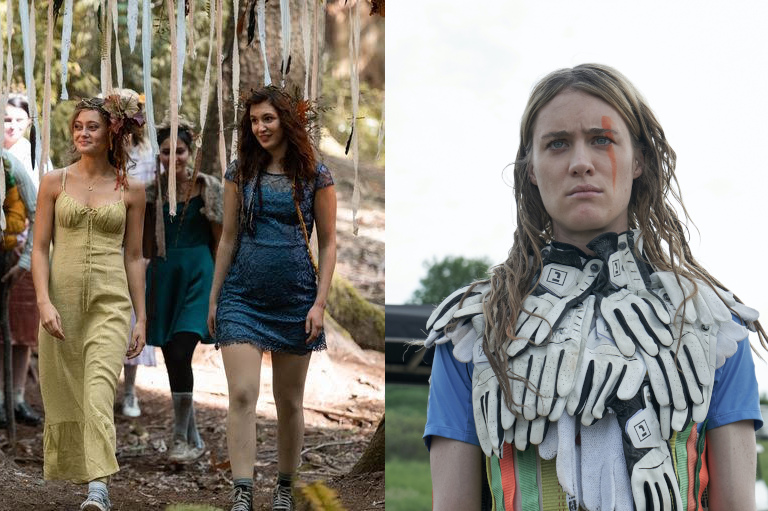
What follows is a guest post by Erich Hatala Matthes.
[Warning: Light spoilers for both shows, but nothing the author thinks would ruin them.]
Do you want to play Would You Rather? No, not that version. Would you rather survive a plane crash with your high school soccer team or survive a deadly pandemic with whoever’s standing nearby when the shit hits the fan? Those are the scenarios served up by Yellowjackets (Showtime) and Station Eleven (HBO Max) both of which wrapped this week. The coincident timing has been revelatory (and not just because Jeevan, one of the Station Eleven leads, makes reference to a movie about a soccer team that eats each other): Despite their differences, both of these shows tackle a set of common themes, and viewing them against each other enhances the power of their divergent approaches to ideas of resilience and vulnerability, surviving and being survived by.
Both shows are concerned with apocalyptic events, though on different scales. In Station Eleven, the pandemic has ravaged the world, knocking it back to a kind of preindustrial society where few have survived. Twenty years later, we join the Travelling Symphony, a group of actors and musicians that traverse “the wheel,” bringing a dose of theater and music to a loop of the remaining settlements near the Great Lakes. The Yellowjackets experience a more private apocalypse: while life goes on as normal elsewhere, their whole world has come crashing down with the airplane, and no one is coming to save them (at least for 19 months). While some of the Yellowjackets ultimately survive their apocalypse, they don’t escape it, dragging it back with them to suburban New Jersey.
Station Eleven has an earnestness that is necessary to make its punches land. It’s no small feat to have characters stage a production of Hamlet in a post-apocalyptic airport and not have it read as farcical; but by insisting on taking itself seriously at every moment, the show sets up this scene to succeed as the emotional apotheosis of the series. It’s not that the show is never funny, but it doesn’t make fun of itself. It can’t, or the spell would be broken. The Symphony’s costumes, cobbled together from all manner of human detritus, are mesmerizing, but blink and they might seem silly. The show knows it needs to hold your gaze, and every element (camera work, soundtrack, dialogue) is designed to achieve this effect.
Yellowjackets, in contrast, thrives on its self-consciousness, not unlike the teenage girls who serve as its protagonists in the nineties storyline. The show is constantly winking at the audience, from its invocation of high school and horror movie clichés to its period soundtrack and pop culture references, which help set the scene, but are also incredibly on the nose. If the show’s premise sounds a little bit like Lost, don’t worry, because one character declares multiple times that “We’re not on an island!” When the team organizes a “Doomcoming” party in lieu of the Homecoming they’re missing while stranded in the wilderness, it wears its elbow-nudges on its sleeve (lacking any way to play music, the team bursts out in a spontaneous a cappella rendition of Seal). Until the dance takes a dark turn, that is.
Whereas Station Eleven wants to completely absorb you in a particular mood, Yellowjackets plays with the whiplash from humor to horror, from the mundane to the traumatic. Yellowjackets is sometimes stressful to watch, precisely because it’s hard to predict what you’ll be subjected to at any moment: violence is lurking around the most innocent corners. Station Eleven has plenty of tragedy, but manages to remain ethereal throughout. This contrast is enhanced by the framing and production of the shows. Station Eleven has a cinematic quality to it. It is more of a 10-hour movie than a TV show. Yellowjackets, on the other hand, has the deliberate feel of network television, with its cliffhangers, “previously”s, and “next time”s. From the camcorder intro with its grungy theme song to the familiar episode format, the show manages our expectations for the steady march of reveals and twists in each episode. This show knows what it’s about, and it wants you to know that it knows.
Both shows confront similar nightmares, most notably, the fear of childbirth in the wild. Whereas Yellowjackets primarily adopts the perspective of the pregnant Shauna, Station Eleven sends us on that ride with Jeevan, who suddenly finds himself the helpless witness to a mass birth event. He is living the compounded fear of the expectant father, ultimately unable to do anything aside from standing by and reminding the laboring women to breathe. While there is the risk of absurdity in the scene of a dozen women simultaneously giving birth in an abandoned department store, the show is too all-in for the viewer to establish any distance: it’s intense, not funny. Yellowjackets, on the other hand, gives us some breathing room from the fear by introducing macabre humor as Shauna dreams of giving birth to a roast chicken. A teenager giving birth in the wilderness is terrifying, but – haha – she’s also starving!
The apocalyptic event (the pandemic for Station Eleven, the crash for Yellowjackets) divides each show into a before and an after, and each wrestles with this breach by jumping back and forth across time. In both shows, the two dominant storylines occur during the world-shattering event and around 20 years later. How do we handle such traumatic disruption? “There is no before” is a refrain that Station Eleven dwells on, and offers as one possible response. It’s a line from another Station Eleven that we encounter in the show itself, the passion-project graphic novel produced by one of the characters that serves as the thread weaving the show’s disparate storylines together. Kirsten, the leading player, venerates the book, but tends to gravitate towards a different line, “I remember damage.” “There is no before” becomes a mantra for The Prophet, the show’s primary antagonist, and part of Kirsten’s task is to help The Prophet see that there is a before, that he can remember damage without being consumed by it. But that’s not to say that there is salvation in the before, either. Another character, Clark, illustrates that danger. Clark in his “museum of civilization” seems too invested in the past, unable to adapt to his new reality; he is trapped in the before, like the objects in his museum, and can’t move on.
Both “there is no before” and “all is before” are unviable approaches to trauma, and Yellowjackets knows this, too. Of the surviving Yellowjackets, Taissa makes the greatest effort to live her life as if nothing has happened. In a scene where the adult Shauna and Taissa describe what their lives might have been like had the plane not crashed, Shauna imagines pure adolescent whimsy, recapturing the dreams of a college-bound high school senior; nothing that resembles her actual life. But when Taissa finishes recounting her own pre-crash ambitions, Shauna’s brow furrows as she reminds Taissa that she actually did end up doing all those things; it seems like the crash didn’t hold her back at all. But despite her seeming success at not letting the past get in her way, Taissa declares that none of these subsequent events felt “real.” She’s still back in the woods, still climbing trees in her sleep. On the other end of the spectrum, teammate Jackie’s parents live completely in the before, forcing Shauna and her husband, Jeff, into an annual retreat to their fantasy of the past (Jackie’s childhood bedroom remains untouched). Jeff pops that balloon over brunch, and it doesn’t take much: the idea of any character finding comfort in the pre-crash world is presented as a delusion from the get-go.
Station Eleven is ultimately a show about coming home, even if the home you return to isn’t the one you left, and it offers a stirring paean to the power of art along the way. Literature, theater, and music drive the narrative and emotional resolutions of the show, reinforcing another of the refrains from Station Eleven the graphic novel, “Survival is insufficient.” Both elements make it especially moving, even uplifting, as we live through our own pandemic. Yellowjackets isn’t the perfectly constructed showpiece that Station Eleven is, but that’s OK, because it couldn’t be that while retaining its cynicism, its self-awareness of its own every move. When the Yellowjackets burst into their 25th high school reunion in slo-mo with The Offspring blaring on the soundtrack, you can feel the show gleefully shouting to the audience, “See that? See what we did there??” We see you, Yellowjackets. And more, in watching these two shows, we see that both morbid playfulness and earnest artistry each offer a compelling approach as we try to avoid the pitfalls of denial and despair. We remember damage, and sometimes we’ll laugh and scream about it, sometimes cry and stare in wonder.
About the Author
Erich Hatala Matthes is Associate Professor of Philosophy at Wellesley College. His new book, Drawing the Line: What to Do with the Work of Immoral Artists from Museums to the Movies, is out now with Oxford University Press and available from your favorite bookstore.



April 19, 2022 at 3:10 pm
https://en.m.wikipedia.org/wiki/Uruguayan_Air_Force_Flight_571
😉